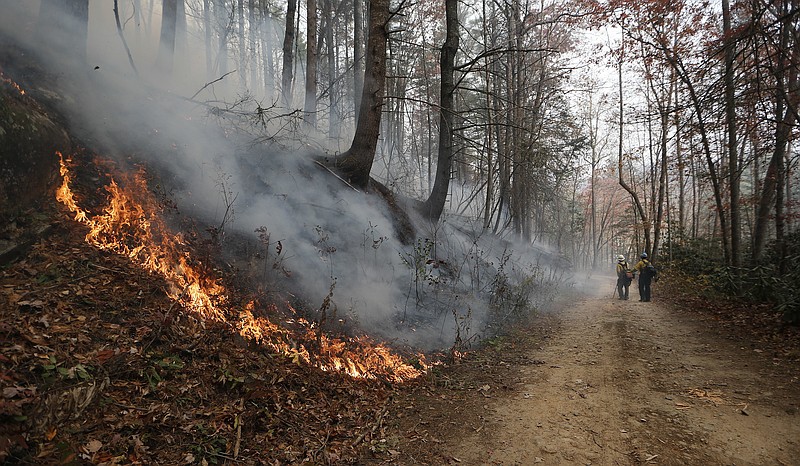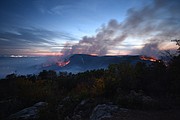Photo Gallery
Arkansas Symphony Orchestra @ Robinson Center Music Hall — 09/22
09/22 — The Arkansas Symphony Orchestra kicked off its 2013-14 season with Tchaikovsky & Rite of Spring, with Philip Mann conducting and Martina Filjak on piano.
TIGER, Ga. - Thick smoke has settled over a wide area of the southern Appalachians, where dozens of uncontrolled wildfires are burning through decades of leaf litter, and people breathe in tiny bits of the forest with every gulp of air.
It's a constant reminder of the threat to many small mountain communities, where relentless drought and now persistent fires and smoke have people under siege.
More than 5,000 firefighters and support personnel, including many veterans of wildfires in the arid West, and 24 helicopters are battling blazes in the fire zone, which has spread from northern Georgia and eastern Tennessee into eastern Kentucky, the western Carolinas and parts of surrounding states.
More than 30 large fires remain uncontained, federal officials said in a Wednesday update. Fires across the region have burned a total of 128,000 acres, or about nine times the size of Manhattan.
"A lot of the ladies just went to tears and said this happens in other places, it doesn't happen here," pastor Scott Cates said as townspeople donated water, cough drops and other supplies for the firefighters at the Liberty Baptist Church in Tiger, Georgia.
Here, these fires don't sleep. They burn through the night, through the now-desiccated tinder of deciduous forests accustomed to wet, humid summers and autumns.
"It doesn't die down after dark," says fire Capt. Ron Thalacker, who came from Carlsbad, New Mexico, and is leading a crew spraying hotspots in Georgia's Rabun County, near the epicenter of the southern fires.
Large, wind-driven fires that scorch pine forests in the West often burn in the tree tops and mellow out at night, but these fires are clinging to the ground and actively burning 24 hours a day, said firefighter Chad Cullum of Billings, Montana.
Cullum spoke briefly, as flames rolled down a mountainside behind him. Then he ordered everyone to get out. "We need to leave," he said sternly, ushering people to move down a rocky dirt road.
Tim Free, a lifelong resident, broke down with emotion as he described how elderly neighbors are struggling with relentless smoke, so thick it blocks the sun.
"Everybody is pulling together," Free said as more donations arrived at the church. "That's where you see your community pull together, and that's what we're fortunate to have here is people who care about people."
Inside the church, where several women were assembling care packages, Brittany Keener said "we really need lubricating eye drops!"
Anyone living through this smoke needs them, but particularly people working to contain the blazes in the forests, where Keener said a burning ember fell into one firefighter's eye.
"Anybody that's outside of their homes is going to have to have something that will basically lubricate their throats -- cough drops, lozenges or even a stick of peppermint," Free said. "Just to get a little lubricant in your eyes is something that's needed daily because of the smoke."
Three firefighters drove 23 hours from Albuquerque, New Mexico, to western North Carolina to battle the Party Rock fire near the town of Lake Lure.
"There was a request for help. We have units available to assist," Edward Nieto said.
Nationally, "there's a pretty good ability to help out the South right now," said Jennifer Jones, a spokeswoman with the U.S. Forest Service. Reinforcements have arrived from at least 37 states, the District of Columbia and Puerto Rico, she said this week.
There hasn't been a fire in the Lake Lure area in a long time, so the forest floor is thick with flammable material, and falling autumn leaves are encouraging the flames to spread, said Victoria Tillotson, a spokeswoman with the North Carolina Forest Service.
Randle Montgomery recalled watching television coverage of wildfires in California and considering himself lucky. He never expected a 4,500-acre blaze to threaten Lake Lure, where he works, and Black Mountain, where he's lived for 16 years.
"The way this thing takes off, they'll get it contained, and it just depends on the wind, but it's turned so many times on us," said Montgomery, 47. "And it's got everybody pretty much on edge."
Tom Stokesberry, an emergency medical technician from Six Rivers National Forest in California, arrived in Georgia's Rabun County on Veteran's Day.
"The goal is to keep this line intact," Stokesberry said, pointing to a narrow, winding dirt road between a burning mountainside and a pasture that, so far, has been untouched by the fire. Just beyond it is a farmhouse. It wasn't clear whether the property had been evacuated.
The smoke is hiding the sun in town, but out at the fire's edge, it appears in the sky, and it is blood red.
"We call that the red eye of the dragon," Cullum says.


